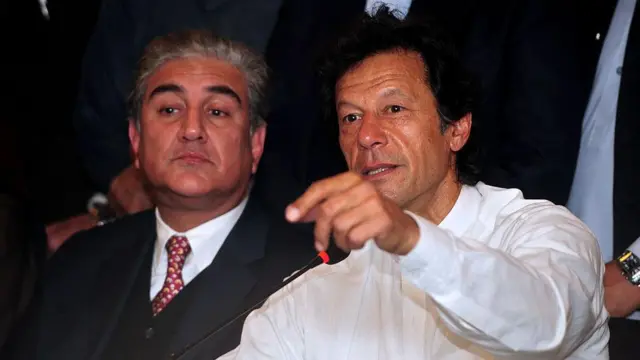The recent wave of convictions and arrests of Pakistan Tehreek-e-Insaf (PTI) leaders, particularly those linked to the May 9, 2023, riots, is having a significant and multifaceted impact on Imran Khan's party, both internally and externally. Internal Changes within PTI: Leadership Vacuum and CommuniRead more

The recent wave of convictions and arrests of Pakistan Tehreek-e-Insaf (PTI) leaders, particularly those linked to the May 9, 2023, riots, is having a significant and multifaceted impact on Imran Khan’s party, both internally and externally.
Internal Changes within PTI:
- Leadership Vacuum and Communication Challenges: With many senior leaders jailed, disqualified, or in hiding, there’s a clear leadership vacuum. While Imran Khan remains the charismatic figurehead, his incarceration limits his ability to directly lead and strategize. This has led to communication challenges and, at times, public disagreements among remaining leaders regarding party strategy, as seen with conflicting statements about protest plans.
- Imran Khan’s Directives from Jail: Despite being imprisoned, Imran Khan continues to issue directives to his party members, urging unity and focus on their protest movement. He has explicitly prohibited public discussion of internal matters to curb infighting.
- Shift in Party Structure: The crackdown has forced a significant restructuring, with new individuals stepping into roles previously held by jailed leaders. Gohar Ali Khan, for instance, was elected as the Chairman of PTI in late 2023, nominated by Imran Khan himself.
- Resilience amidst Adversity: Despite the immense pressure, the PTI leadership maintains a defiant stance, denouncing the verdicts as politically motivated and part of a broader campaign to dismantle the party. They are mobilizing for new protest movements, indicating a continued resolve to challenge the government.
- Concerns over “Minus Imran” Formula: There have been speculations, even from within the party (e.g., Imran Khan’s sister Aleema Khan), about a “minus Imran” formula at play, where the establishment might be attempting to isolate him and reshape the party without his direct leadership. However, party leaders largely deny internal rifts and emphasize unity around Khan’s release.
External Perception and Impact on PTI’s Stance:
- Perception of Political Motivation: The timing and severity of the sentences, particularly the 10-year imprisonments for leaders like Dr. Yasmin Rashid (who is battling cancer), are widely seen by PTI and human rights groups as politically motivated attempts to suppress dissent and dismantle the party. This risks undermining public confidence in the justice system.
- Challenges to Democratic Freedoms: International observers and human rights groups have raised concerns about the state of democratic freedoms and judicial independence in Pakistan, viewing the mass convictions as a significant blow to a major political party.
- Impact on Political Landscape: Analysts suggest that the aggressive targeting of PTI is designed to reshape the political landscape, potentially in favor of a more compliant opposition. The goal appears to be to neutralize PTI’s political footprint ahead of future elections.
- Continued Street Power (or lack thereof): While PTI continues to call for protests, questions remain about its ability to consistently mobilize large-scale street power after repeated crackdowns and arrests. However, the party insists it has not bowed to pressure and will continue its movements.
- Legal Challenges and Appeals: PTI leaders are actively challenging the verdicts in superior courts, which could prolong the legal battles and keep the issue in the public discourse.
- Risk to International Standing: PTI leaders have also claimed that the harsh punishments could jeopardize Pakistan’s GSP+ status and FATF compliance, suggesting a potential international dimension to the crackdown.
In essence, the punishments are a severe blow to PTI’s organizational structure and immediate political maneuvering. While the party maintains a defiant public stance and aims to mobilize its base, the ongoing legal battles, incarceration of key figures, and alleged efforts by the establishment to weaken it will undoubtedly continue to shape its internal dynamics and external perception in the coming months. The party’s ability to maintain unity and rally support despite these challenges will be crucial for its future.
See less

There can be several reasons why lights might go out during an IPL match in India. Recently, one prominent reason has been security concerns related to military tensions. Here's a breakdown of possible causes: Security Concerns and Military Tensions: In recent times, especially during the IPL 2025 sRead more
There can be several reasons why lights might go out during an IPL match in India. Recently, one prominent reason has been security concerns related to military tensions.
Here’s a breakdown of possible causes:
Security Concerns and Military Tensions: In recent times, especially during the IPL 2025 season, a match between Punjab Kings and Delhi Capitals in Dharamsala was called off due to a power outage. While initially thought to be a floodlight malfunction, it was later confirmed to be part of a wider blackout due to heightened security concerns and air raid alerts in areas near the India-Pakistan border. This led to the evacuation of players and spectators for their safety. There were even claims by Pakistan’s Defence Minister of their “cyber warriors” hacking floodlight systems, though this claim has been met with skepticism. Such situations highlight how geopolitical tensions can directly impact events like the IPL.
Technical Malfunctions: This is a common cause for power outages in any large venue. It could be due to:
Adverse Weather Conditions: Severe weather events like heavy rains or strong winds can disrupt power supply to the stadium, leading to temporary blackouts or even match delays/cancellations.
Local Power Grid Problems: While stadiums often have their own power arrangements, they can still be affected by issues with the broader local electricity grid, leading to a general power outage in the area that extends to the stadium.
In the specific case of the Dharamsala match in IPL 2025, the power outage was a direct consequence of security measures taken in response to escalating cross-border tensions, leading to a wider blackout in the region.
See less